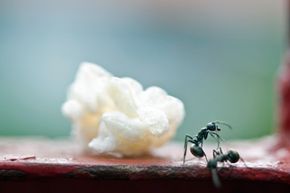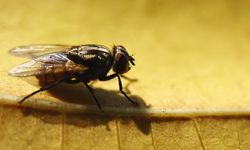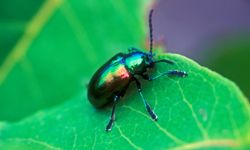Key Takeaways
- To prevent ant infestations in cupboards and pantries, maintain cleanliness by promptly cleaning up spills and sealing any cracks where ants could enter.
- Use ant baits to disrupt and eliminate ant colonies, ensuring ants consume the bait and share it within their nest, effectively reaching and eliminating the queen.
- Home remedies like cinnamon, cayenne pepper and diatomaceous earth can act as natural deterrents, keeping ants away from stored food areas.
If you're looking for a house guaranteed to be ant-proof, you'll have to move to Antarctica. It's one of the few spots on the planet that is too inhospitable for ants. That doesn't mean you have to share quarters with roaming columns of foraging insects, though. Ants are pretty predictable, and you can keep them out of your cupboards and pantry if you adopt a few ant-busting habits.
Ants send out scouts to look for food. When they find a good source of nourishment, they return to the nest to tell their friends, who then follow the scout ant's pheromone trail right to your doorstep -- or cupboard. That thick column of ants snaking its way from the soda cracker box to your back door started with a single ant scout who -- hot on the trail of a dropped cracker crumb -- found your stash of cookies, cat food, jelly donuts or cereal and reported his findings to headquarters.
Advertisement
So wondering how to get rid of ants? Well long before he told his buddies, there were a few things you could have done to avoid problems with ants in the first place:
- Keep things clean -- A little spilled soda or dab of peanut butter may seem harmless, but if an ant stumbles on it and thinks it has potential, that dribble could result in an ant infestation. Clean up spills as soon as they occur. This will help keep ants outdoors where they belong. It will reduce the chance of your countertops and other surfaces becoming a breeding ground for dangerous bacteria, too.
- Seal cracks -- That mismatched seam at the back of your cupboard might look like a minor structural flaw to you, but to an ant, it's like a superhighway leading right to the best grocery store in town. Take the time to identify and seal cracks and holes in your cupboards and along your baseboards, windows and doors. Consider making a project of it and also checking your home's foundation, attic, crawlspace and the areas where water pipes and electrical wires enter the house. Cracks should be sealed and rechecked periodically for suspicious droppings or mud spatters that could mean you have problems with mice, rats, wasps, bees, ants or termites. Use caulk to seal large cracks, and fill tiny cracks with petroleum jelly.
- Use bait -- Ant baits are an ingenious way to eliminate ant colonies on your property. Here's how it works: Ants eat the slow-acting poisoned bait and introduce it to the colony. The queen dies, and the nest soon disperses. One nice thing about being proactive about putting down bait traps is that you can eliminate ant troubles long before they become problems.
- Use home remedies -- If you like the DIY approach to keeping ants out of your cupboards, try sprinkling cinnamon or cayenne pepper on your cabinet shelves. Ants avoid both of these strong-smelling spices. They also steer clear of bay leaf.
- Employ deterrents -- If you know ants are getting in through a specific location but have been unsuccessful in your efforts to block their access, try putting down diatomaceous earth. These microscopic shells are like razorblades to ants, so they won't cross them. You can also track ants back to their nest and try soaking them out with a water hose. Just insert the hose into the nest as far as it will go, and turn on the water. A few treatments should flood the nest and convince the ants to move to a new location. Make certain you aren't dealing with fire ants before you try this, though.
Advertisement



